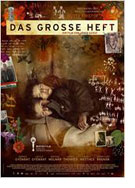

Opening 7 Nov 2013
Directed by:
János Szász
Writing credits:
Tom Abrams, Agota Kristof, András Szekér, János Szász
Principal actors:
András Gyémánt, László Gyémánt, Gyöngyvér Bognár, Piroska Molnár, András Réthelyi
This film made me sick to a point that I almost left the movie theater several times. I stayed because this is a very good film, although I am not sure I ever want to watch it again. In World War II Hungary, a soldier (Ulrich Matthes) returns to his upper-class home. His loving wife (Gyöngyvér Bognár) and his twin sons (András and László Gyémánt) meet him enthusiastically. In order to protect the children, their parents decide to let them live with their grandmother (Piroska Molnár) in the country. Before both boys leave, their father gives them a notebook in which they are supposed to capture the truth of their daily lives. Their mother, on the other hand, tells them to keep studying and to survive the war until she comes back to get them. The grandmother, who supposedly killed her husband and goes by the name “witch”, hates her daughter and immediately calls her grandsons “sons of a bitch”. In their new life, the boys have to work in order to earn meals and are beaten awake in the morning. In order to survive, the boys turn the advice they were given into a program that is supposed to make them harder. First, they slap each other until they don’t feel the pain anymore. Second, they curse at each other until they don’t hear the humiliation anymore. They add a new step to their program every time they experience cruelty, which is often. According to their own set of morals, the boys exercise cruelty themselves, but also kindness. In order to make sense of it all, they keep record of their life in the notebook.
The Notebook is the cruelest movie I ever actually finished. I left The Passion of the Christ and Sin City, because I felt that the extreme violence was gratuitous. Not so in this movie: everything we see could be happening somewhere in a war zone around the world this very moment. The structure of the story has a timeless appeal that reminds me of the hero’s journey in fairy tales, except that we don’t know for sure, whether we are witnessing the becoming of heroes or demons. I watched movies like Inglourious Bastards without being livid and sick by the end of the movie (now that tells us something about collective emotional blunting right there), I am trying to make sense of why the violence in this film shocked me so much. I think it was the heart break. My heart broke for these little boys, who had to inflict extreme pain on themselves in order not to die – physically and emotionally. My heart broke for all people who become inhumane in order to keep at least a tiny sense of dignity and who will probably never again be able to experience real joy, beauty and ecstasy in their lives. ***** stars for this masterpiece about (in)humanity that is not for the faint of heart. (Katia Trost)